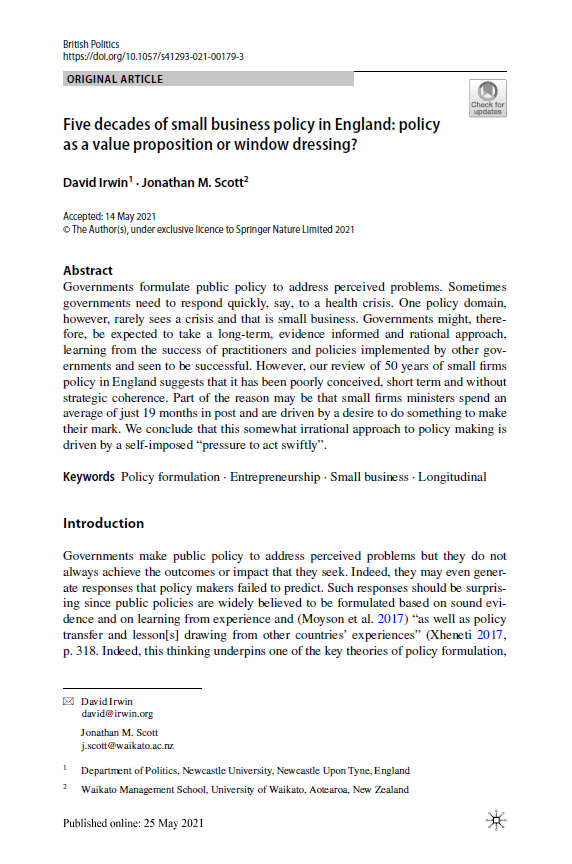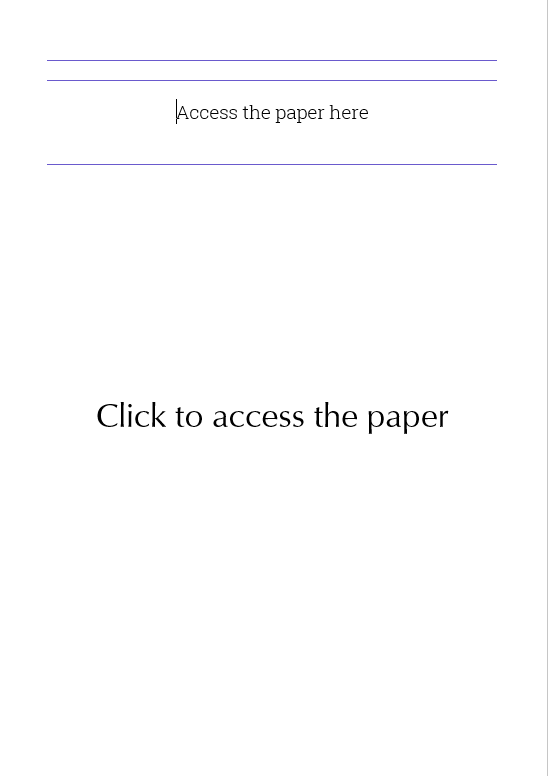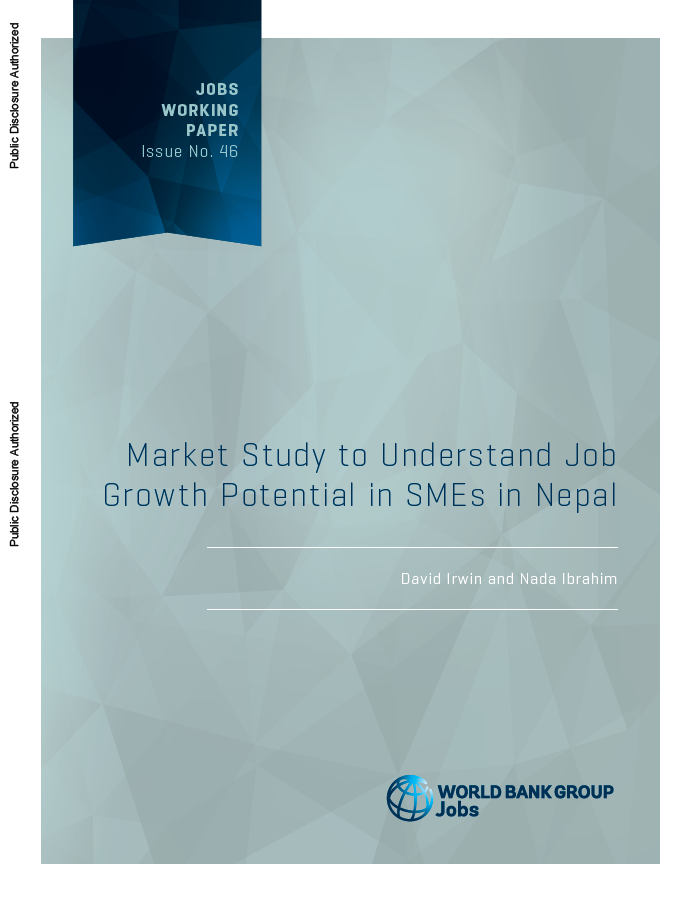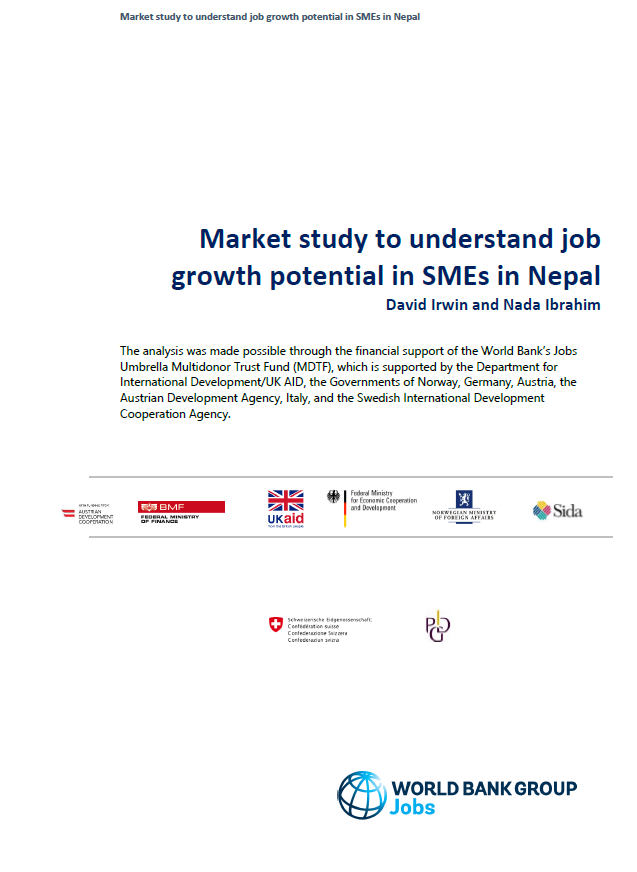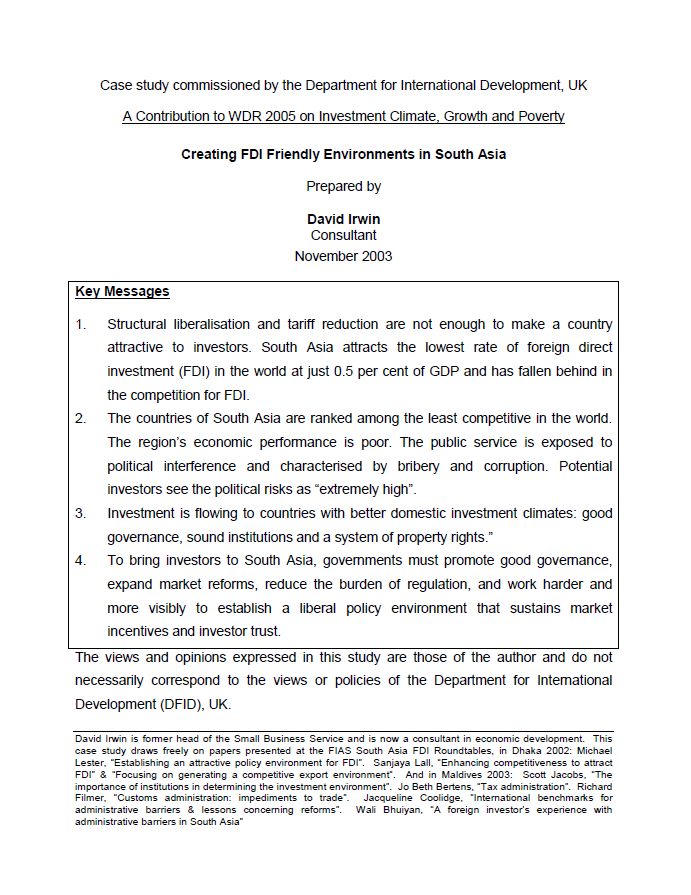Irwin Grayson Associates provides policy advice and support (a) to organisations who are interested in improving the
enabling environment and, in particular, who wish to promote private sector advocacy, increase levels
of private public dialogue and look for ways to engage in regulatory reform and (b) to governments, agencies
and others who wish to do more to support enterprise and economic development. Most of my work on public
policy reform is supporting business and trade associations to identify constraints that make it hard(er)
to do business and then providing mentoring support as they develop a policy position. You will find
some examples at my
business
advocacy network page on good practice.
Five decades of small business policy in England: policy as a value proposition or window dressing?
Irwin, D. & Scott, J.M (2021), Five decades of small business policy
in England: policy as a value proposition or window dressing? British Politics, 18, pp.
300-319
Governments formulate public policy to address perceived problems.
Sometimes governments need to respond quickly, say, to a health crisis. One policy domain,
however, rarely sees a crisis and that is small business. Governments might, therefore, be
expected to take a long-term, evidence informed and rational approach, learning from the
success of practitioners and policies implemented by other governments and seen to be
successful. However, our review of 50 years of small firms policy in England suggests
that it has been poorly conceived, short term and without strategic coherence. Part
of the reason may be that small firms ministers spend an average of just 19 months in
post and are driven by a desire to do something to make their mark. We conclude that
this somewhat irrational approach to policy making is driven by a self-imposed “pressure
to act swiftly”.
Entrepreneurial ecosystem in Nepal (2019)
In 2019, working with
IMC Worldwide and two consultancies in Nepal, David
was team leader for a project intended to assist the World Bank to understand the small business
ecosystem and the availability of support for small and growing businesses, as they aimed to put
together a programme with the Government of Nepal intended to help firms to grow and, in particular,
to create new jobs. The report is available on the World Bank website.

Many thanks to you all for a tremendous effort that has yielded very interesting
and well-documented findings [...] I am confident that at a minimum it will inform
better project design and more effective engagement with Government.

Elizabeth Ruppert Bulmer, Lead Economist, Jobs Group, Social Protection
& Jobs, World Bank Group
Improving the environment for SMEs in Rwanda (2019)
David Irwin was commissioned, with Associate, Eric Ndahayo, by Ikiraro, a programme managed by Palladium and funded
by DFID (now FCDO) to undertake an assessment of Rwanda's entrepreneurial ecosystem for the Ministry of Commerce.
The objective of the assignment was to review the policy environment as it related to SME formation and growth
and then to make suggestions to reform public policies in order to stimulate further entrepreneurship and
industrial development. The approach included an extensive literature review together with a large number of
stakeholder interviews. We offered a number of suggestions for action – covering government policy, consultation
and dialogue, and business support – which were well received by the Ministry for Industry.
One of the recommendations was for the launch of a web-based information system to support new and growing
businesses. Ikiraro was able to find a small budget to commission IGIHE, a local web service, to establish
Kura Business Advisory. This was launched at
kura.rw though has metamorphosed into a more general
platform to support young people.
Investing in enterprise, UK (2005)
IGA, with support from three associates (Luke Taylor, ALan Bretherton and Erik Pages) was commissioned by the
British Venture Capital Association to prepare a report entitled "Investing in enterprise: promoting a better
understanding of business & entrepreneurship in education". The report was prepared to assist the BVCA
Education Commission determine how best the BVCA, member companies, and the staff and clients of member companies
could support education for entrepreneurship amongst young people in secondary and tertiary education. It made
recommendations both for reforms to public policy and for BVCA projects.
World Development Report 2005: background paper (2004)
A number of background papers were commissioned for the World Bank's
World
Development Report 2005: A Better Investment Climate for Everyone. I was commissioned by DFID (now FCDO)
to write one of those background papers - Creating FDI Friendly Environments in South Asia - reviewing and
synthesising papers presented at a couple of round tables looking at how to create a better investment climate
in order to attract more foreign direct investment.
SME policy, China (2003)
I was invited by DFID (now FCDO) to be a speaker at conference organised by the Chinese Government’s State
Economic & Trade Commissionfocusing with a focus on government policy formulation for small business
promotion and support. This was followed by a commission to write a paper identifying lessons from
the development of the enterprise agency movement in the UK as part of a multi-country report to help
the SETC develop their own approaches to business support.
Drivers of change, Nigeria (2003)
I was commissioned by DFID (now FCDO) to prepare a paper as a contribution to a major initiative to
analyse and reflect on possible drivers for change in Nigeria and specifically to consider the positive
impact that could be achieved through the private sector taking a lead on integrity and transparency.
Small Business Service (2000-2002)
Founder Chief Executive of the UK Government’s Small Business Service – with ultimate responsibility
for advising the Secretary of State for Trade & Industry on all aspects of small firms’ policy. This
included, inter alia, writing “Think Small First” setting out a framework of principles intended to
encourage government to think about the implications for small businesses of their policy and actions,
(with the title subsequently taken by the EU to headline their SME Act as well) and referenced in
Hansard,
contributing to the Competitiveness White Paper and creating a directorate to mitigate the effects of
regulation and red tape. I sat on the Ministerial Panel for Regulatory Accountability (estbalished as a cabinet
sub-committee). I represented the Government on the EU Commission’s Enterprise Policy Group. I created Small
Business|Europe to act on behalf of the small business representative groups in Brussels influencing the
Commission and ensuring that they understood the small business view. Inter alia, I influenced a considerable
number of government regulations and legislation - including taking a business friendly approach to flexible
working and introducing Business Improvement Districts rather than levying supplementary rates on business. I
persuaded the government to adopt a policy of always seeking to consult with business and allowing a minimum
period of 12 weeks.



